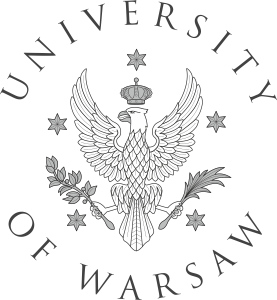Laboratory of Technology of Organic Functional Materials
LABORATORY OF TECHNOLOGY OF ORGANIC FUNCTIONAL MATERIALS
Head of the laboratory:
Dr hab. Grzegorz Litwinienko, prof. UW
Professors and Associate Professors:
Dr hab. inż. Andrzej Kaim, prof. UW
Other researchers:
pracownicy naukowi i naukowo-dydaktyczni:
- Dr Jacek GrębowskI
- Dr inż. Katarzyna Jodko-Piórecka
- Dr Agnieszka Krogul-Sobczak
- Dr Elżbieta Megiel
- Dr Piotr Piotrowski
- Dr inż. Jadwiga Skupińska
- Dr Hanna Wilczura-Wachnik
pracownicy inżynieryjno-techniczni:
- Tech. Artur Gajda,
- Mgr Adam Myśliński
secretariat: Barbara Grabowska
PhD Students:
- Mgr Jakub Cędrowski
- Mgr Robert Czochara
- Mgr Kaja Sitkowska
- Mgr Ewelina van Wenum (Kowalewska)
Website address:
http://beta.chem.uw.edu.pl/people/AMyslinski/nowy/zaklad.html
Research topics:
The research activity of the group of Prof. Grzegorz Litwinienko is divided into three themes:
– chemistry of radicals and antioxidants,
– thermal analysis,
– carbonylation processes catalysed by palladium compounds.
The research activity of the group of Prof. Andrzej Kaim is divided into five themes:
– nitroxide-stabilized metallic nanoparticles for biomedical applications
– bimetallic nanostructures as catalysts and active supports for organocatalysts
– preparation of smart polymeric materials using Controlled Radical Polymerization
– egzohedral functionalization of fullerenes using cycloaddition reactions
– synthesis of metal nanoparticles (Au, FexOy) with unique catalytic properties.
The main research topics:
Studies on the rate of initiation of lipid peroxidation. A knowledge about the initiation rate has a capital importance during the studies of mechanism and kinetics of autoxidation and autoxidation inhibited by antioxidants. The studies are performed in emulsions and suspensions of liposomes.
Antioxidant activity of polyphenols in homo- and heterogeneous systems. The aim of this thematic line of our research is to determine the impact of acid-base equilibria on the antioxidant activity of phenols, to obtain the structure-activity relationship for mono- and polyphenolic antioxidants, to determine the role of microenvironment in the antioxidant activity of phenols and polyphenols and to describe the synergistic effects of antioxidants.
Studies on the antioxidant activity of catecholamines. Neurodegenerative diseases, such as amyotrophic lateral sclerosis, Alzheimer’s disease, and Parkinson’s disease, are characterized by a progressive degeneration and death of neurons associated with the overproduction of the Reactive Oxygen Species (the oxidative stress). Our goal is to get insights into protecting activity of catecholamine neurotransmitters in lipid systems exposed to Reactive Oxygen Species.
Application of thermal analysis techniques for studies of lipid oxidation. In our research we compare the standard analytical techniques (like Rancimat) with the results obtained by using thermal analysis (Differential Scanning Calorimetry, DSC).
Studies on carbonylation processes catalysed by palladium compounds. Carbonylation of aromatic nitrocompounds with carbon monoxide is alternative, waste- and fosgene-free method of production of aromatic isocyanates, carbamates, and ureas – industrially important intermediates and large scale final products. Many derivatives of ureas and carbamates exhibit biological activity and for this reason are applied in pharmacy. Our studies are aimed at developing new, environmentally safe, selective and active catalysts for carbonylation of aromatic nitrocompounds and amines.
Other information:
Apparatus
- High pressure autoclave 4593 PARR
- DSC Differential Scanning calorimeter Q20 TA Instruments
- Clark-type oxygen electrode
- FTIR Spectrometer Shimadzu
- GC /FID + autosampler HP
- GC/MS Shimadzu
- HPLC Waters
- ICT – Isothermal Titration Calorimeter TA Instruments NANO ITC
- Stopped flow with UV detection Applied Photohysics
- TG Termogravimeter Q50 TA Instruments
- Zetasizer nano Malverrn Instruments Nano ZS

